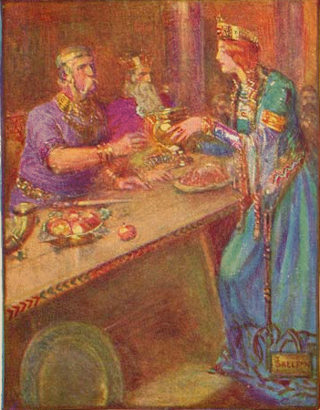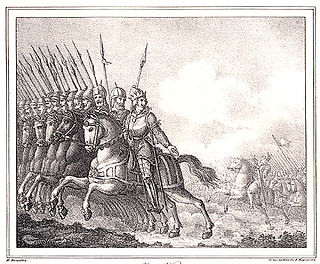Related Research Articles

Hengist and Horsa are Germanic brothers said to have led the Angles, Saxons and Jutes in their invasion of Britain in the 5th century. Tradition lists Hengist as the first of the Jutish kings of Kent.

Offa is a semi-legendary king of the Angles in the genealogy of the kings of Mercia presented in the Anglo-Saxon Chronicle. He is the son of Wermund and the father of Angeltheow. His name is also mentioned in the Old English poem Widsith. He has been identified with Uffo, a legendary Danish king in the Gesta Danorum by Saxo Grammaticus.

Vortigern, also spelled Vortiger, Vortigan, Voertigern and Vortigen, was a 5th-century warlord in Britain, known perhaps as a king of the Britons or at least connoted as such in the writings of Bede and Gildas. His existence is contested by scholars and information about him is obscure.

Hrólfr Kraki, Hroðulf, Rolfo, Roluo, Rolf Krage was a semi-legendary Danish king who appears in both Anglo-Saxon and Scandinavian tradition.

Hrothgar was a semi-legendary Danish king living around the early sixth century AD.

Eadgils, Adils, Aðils, Adillus, Aðísl at Uppsölum, Athisl, Athislus or Adhel was a semi-legendary king of Sweden, who is estimated to have lived during the 6th century.
"Widsith", also known as "The Traveller's Song", is an Old English poem of 143 lines. It survives only in the Exeter Book, a manuscript of Old English poetry compiled in the late-10th century, which contains approximately one-sixth of all surviving Old English poetry. "Widsith" is located between the poems "Vainglory" and "The Fortunes of Men". Since the donation of the Exeter Book in 1076, it has been housed in Exeter Cathedral in southwestern England. The poem is for the most part a survey of the people, kings, and heroes of Europe in the Heroic Age of Northern Europe.
Various gods and men appear as sons of Odin or sons of Wodan/Wotan/Woden in old Old Norse and Old High German and Old English texts.

Beowulf is a legendary Geatish hero in the eponymous epic poem, one of the oldest surviving pieces of English literature.
The Battle on the Ice of Lake Vänern was a 6th-century battle recorded in the Norse sagas and referred to in the Old English epic Beowulf. It has been dated to c. AD 530.

The Varini, Warni or Warini were one or more Germanic peoples who originally lived in what is now northeastern Germany, near the Baltic sea.
The Myrgings were a clan and people of Saxon origin who, together with their king Eadgils, are only mentioned in the Old English poem Widsith. They are mentioned as the people of the scop Widsith. They appear to have been the neighbours of the Angles and Offa of Angel, who was involved in a war against them. Perhaps they were a dynasty or clan competing for power with Offa over the rule of the Angles, though Offa slew two Myrging princes, probably the sons of Eadgils ; this Eadgils was later killed by Ket and Wig, the sons of Freawine, a governor of Schleswig who challenged Eadgils to combat while he was pillaging in the Angle lands. Freawine was killed in combat and the Myrgings may then have overrun Schleswig, as they are said to have settled or had holdings at Schleswig, though they were eventually defeated by Offa, who extended the boundary with them to Fifeldor.

Wermund, Vermund or Garmund is an ancestor of the Mercian royal family, a son of Wihtlaeg and father of Offa. The Anglo-Saxon Chronicle makes him a grandson of Woden, but the Gesta Danorum written by Saxo Grammaticus goes no further than his father, while the Brevis Historia Regum Dacie of Sven Aggesen makes Wermund son of king Frothi hin Frokni.

The Angles were a dominant Germanic tribe in the Anglo-Saxon settlement of Britain, and gave their name to the English, England and to the region of East Anglia. Originally from Angeln, present-day Schleswig-Holstein, a legendary list of their kings has been preserved in the heroic poems Widsith and Beowulf, and the Anglo-Saxon Chronicle.
The Timeline of conflict in Anglo-Saxon Britain is concerned with the period of history from just before the departure of the Roman Army, in the 4th century, to just after the Norman Conquest in the 11th century.
Hrólfs saga kraka, the Saga of King Rolf Kraki, is a late legendary saga on the adventures Hrólfr Kraki, a semi-legendary king in what is now Denmark, and his clan, the Skjöldungs. The events can be dated to the late 5th century and the 6th century. A precursor text may have dated to the 13th century, but the saga in the form that survived to this day dates to ca. 1400. 44 manuscripts survive, but the oldest one of them is from the 17th century, although a manuscript is known to have existed c. 1461 at the monastery of Möðruvellir in Iceland.
Wihtlæg, Whitlæg, Wighlek, Wiglecus, Wiglek, Witlac or Viglek is a legendary king of either Denmark or Angeln in Germanic legends. He is known in Saxo's kings of Denmark by the name of Vigletus.
Freawine, Frowin or Frowinus figures as a governor of Schleswig in Gesta Danorum and in the Anglo-Saxon Chronicle as an ancestor of the kings of Wessex, but the latter source only tells that he was the son of Friðgar and the father of Wig.

Ket and Wig appear in the Gesta Danorum as the sons of Frowin, the governor of Schleswig. Wig also appears in the Anglo-Saxon Chronicle as the son of Freawine (Frowin) and father of Gewis, eponymous ancestor of the kingdom of Wessex and their kings, but this is thought to be a late manipulation, inserting these heroes into a pedigree borrowed from a rival royal house, in which the Bernician eponym Bernic was replaced by the Wessex Gewis.